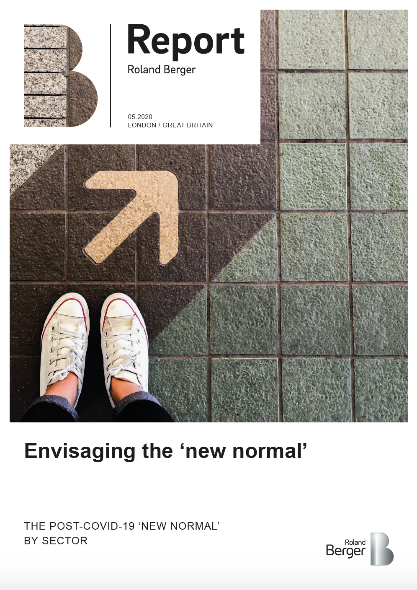Envisaging the new normal
![{[downloads[language].preview]}](https://www.rolandberger.com/publications/publication_image/Roland_Berger_COVID-19_NewNormal_Cover_download_preview.png)
The COVID-19 pandemic will impact economic sectors differently. Better prepare for the ‘new normal’ with Roland Berger’s seven forces framework.


"Sometimes the most affected sectors present the most attractive investment opportunities."
The COVID-19 pandemic is leading us into what will likely become the most severe economic downturn since the Great Depression. While behavioural shifts like working from home, buying goods online or avoiding long-haul flights may seem like temporary measures to help weather the coronavirus storm, we believe such changes will persevere in the long term. In other words, we believe that fundamental change will become the new imperative. This global shift will inevitably bring about a ‘new normal’. Roland Berger’s latest report, “Envisaging the ‘new normal,’" outlines the key forces of change and impact across industries to help private equity investors plan for the recovery of their portfolio companies and develop future investment strategies.
The spread of COVID-19 is expected to trigger structural changes to various economic sectors. Seven forces have been identified as shaping the ‘new normal’, together creating a framework that can be used to comprehensively assess the impact of the pandemic. These seven forces include: greater influence of governments on business; scrutiny of the role of business in society; change in consumer behaviour; shift in countries’ relative importance; a new paradigm of risk management; new ways of working and operating models; and increased importance of technological innovation.
Trends such as deglobalisation, heightened health consciousness, deeper environmental considerations and digital transformation have been accelerated by the pandemic and are becoming key drivers of long-term change. This could reinvigorate discussion on universal healthcare, tip the geopolitical balance or reinforce the centrality of the governments’ role. Such changes would disproportionately affect industries and sectors but generally create both challenges and opportunities across the board, particularly for private equity investors.
Healthcare and telecom have fared well from the disruption and may even experience a positive impact from the crisis, as they fit under the new categorisation of ‘essential’. Technology is also likely to benefit as it will underpin growth in demand across all sectors. Travel and tourism, and aerospace and defence, on the other hand, will be the most negatively affected, largely owing to a lower demand for long-haul travel, reprioritisation towards healthcare and social care and remote working trends. Retail will also be heavily impacted due to the rapid adoption of e-commerce, which will encourage supply chain reorganisation.
When it comes to private equity investments, the speed and efficacy with which owners and managers brace their organisations for the ‘new normal’ will determine long-term success. Roland Berger is ready to use the seven forces framework for active scenario planning to help portfolio companies address this uncertainty and prepare for future investments.
![{[downloads[language].preview]}](https://www.rolandberger.com/publications/publication_image/Roland_Berger_COVID-19_NewNormal_Cover_download_preview.png)
The COVID-19 pandemic will impact economic sectors differently. Better prepare for the ‘new normal’ with Roland Berger’s seven forces framework.